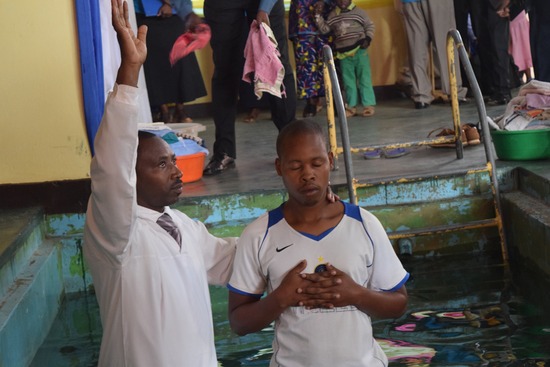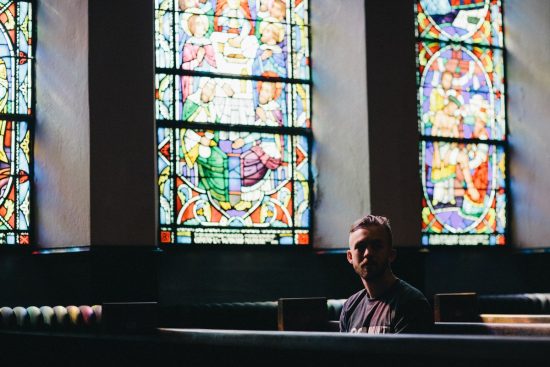Whether you heard about the Seventh-day Adventist Church through a traveling evangelist, during your online searches, or through a loved one or relative, you might be considering joining yourself.
There are a few steps involved in the process of becoming a member of the Adventist Church.
This is a process that happens as the Holy Spirit guides you. It’s best to not rush it. Let the Holy Spirit take you along at His pace for you.
You may not know much about God as you begin this journey, and that’s okay. That’s what it’s all about—learning about Him and His truth. You’ll want to pray often to talk to Him about what you are learning and thinking. And truly, we never stop learning about God and His goodness, no matter how long we have been Christian.
You may also already have a thriving relationship with God, which is wonderful! Coming to Adventism might be the result of God showing you further truth in the Bible.
But how exactly do you go about joining the church? Do you have to go somewhere or fill out a form?
In this article, we’re going to get into that. We’ll lay out the few steps you’ll want to follow, as well as why they’re important and some other common questions.
We’ll dig into:
- The steps to becoming an Adventist Christian
- How you know you’re ready
- Who is involved in the process to become an Adventist
- How long the process usually takes
Let’s start with what you want to know: the steps involved.
The steps to becoming an Adventist Christian

Photo by Nathan Dumlao on Unsplash
As we said before, the Holy Spirit will be your companion as you follow these few steps to becoming a Seventh-day Adventist. It doesn’t matter if you don’t know anything about God or have already developed a relationship with Him.
You’ll want to be careful not to treat these steps like boxes to check off just to say you did them. You want to be sure you resonate with the things you’re learning—do you believe in these things with your heart? To continue with the process, you’ll want to feel truly convicted.
Now let’s take a look at these steps!
Learn about Seventh-day Adventists
The first thing you want to do is learn about Seventh-day Adventists and their beliefs. As we already said, you never want to go into something blind. You want to spend time researching and understanding before making such a big decision.
You can learn about Adventists through other pages on this site or the church’s main website, Adventist.org. You can also read books published by Adventist publications like Pacific Press or the Review and Herald.
While you’re learning, you may also want to have a Bible on hand to study for yourself the things you read.
You can also request information from your local Adventist Church, which leads us to another step of the process.
Find your local church
When you have become familiar with Adventist beliefs, find your local church and attend Sabbath School and services one Sabbath. And this step doesn’t necessarily have to happen after the first step—attending church can help you as you learn about Adventists.
In visiting a church, you can get acquainted with the church members, who are always glad to have visitors! You can also meet the pastor or head elder.
Attending church also allows you to hear other beliefs you may not have come across in your initial reading.
Request Bible studies
The next thing you’ll want to do is request Bible studies. If you’ve attended your local church, you can ask the pastor or head elder, and they will be more than happy to study with you. You could also ask another church member or Bible worker at the church.
Why do Bible studies when you’ve already been learning about Adventism and the Bible?
This is a chance for you to do a deep dive into Adventist beliefs and how they line up with Bible teachings. You’ll go through the 28 Fundamental Beliefs and look at the core doctrines Adventists believe in. Some of these include the Second Coming, the Ten Commandments, and the state of the dead. You’ll also get a sneak peek at the history of the Adventist Church and its founders, like Ellen G. White.
Not only do you get a thorough, sequential study of the Word of God and Adventist beliefs, but you get to do it one-on-one with the pastor or another person studying with you. Here, you can ask any questions you may have. No questions are too silly! The person you are studying with wants you to ask questions because it means you’re thinking and want to know more.
When you finish your Bible studies, there aren’t any tests to “pass” them. They are designed to help you study God’s Word and build your relationship with Jesus Christ, not to pass a test. It is up to you to learn all you can.
Make the commitment

Once you feel you have a good, solid understanding of Adventist beliefs within the Bible, it’s time to officially commit yourself to your new beliefs. This is done through baptism.
Baptism is a public profession of faith—telling everyone openly that you have adopted belief in Jesus through the Adventist understanding of His Word. Baptism is a celebration—a wonderful time in your life.
In the Adventist Church, you’re baptized by immersion. This means you’re dipped totally underwater—the way the Bible instructs us to be.
On the technical side, baptism automatically makes you a member of the Seventh-day Adventist Church. This gives you a say in church matters and allows you to hold positions in the church, like deacon or treasurer.
If you have already been baptized by immersion into another Protestant denomination, you can also choose to make a profession of faith instead of being rebaptized.
A profession of faith is the same idea as baptism: it’s a formal declaration that you believe in Jesus and want to be part of the Adventist Church. You just aren’t immersed in water, like baptism.
Either at the same time or within the next weeks after your baptism or profession of faith, your church will likely have a reading, or public vote, on whether to accept you as a member. Don’t worry about this step: most people are eagerly voted in!
Why these steps are important
Following these steps is important because they help you understand more about the church you’re joining and the community of believers you’ll be a part of.
You’ll get to meet the head of the community—the pastor—and see how the church functions.
You’ll get to see how Adventists put their beliefs into practice daily. Not to mention you’ll get to learn what everything means and figure out the context behind everything you’ve heard or read.
All of these things will help you thrive in your new-found church community. This is why going through these steps is so fundamental.
But do you have to become a member to be a part of the church?
No, it’s not mandatory. But practically speaking, it’s a good idea if you want to be a part of the church to go ahead and become a member.
Logistically, membership helps keeps things organized in the structure of the church and the General Conference, the worldwide representative body of the church. We live in a world of databases and systems, so having a membership makes it easier in church structure.
But most of all, there is something special about membership. It makes a person feel especially connected to a community and prioritize their commitment there. When you become an official member, you are more likely to be involved, and because of your involvement, you’ll likely feel more like a part of that church family.
How you know you’re ready
As we’ve said earlier, there is no magic formula to determine when you’re ready. You don’t have to be a certain age or a certain economic status. People of all ages, from children to high school age to older people join the church, and people of all walks of life and economic status are welcome.
The Holy Spirit works on our hearts in its own time, little bit by little bit, guiding us to the truth as we are ready to receive it.
But it’s important to be sure of a few things before you make the commitment. You’ll want to accept the Lord Jesus as your Savior, and thoroughly understand our fundamental beliefs as the Bible teaches them, as we outlined in the steps above.
And, most importantly, you will want to feel really convicted of these things. You don’t want to become a member just because your spouse or friend did. You must personally want to believe in your heart the Biblical truths shown to you.
Who is involved in the process to become an Adventist
Normally, this will be the pastor, elder, or Bible worker in your area or local church. They will study the Bible with you and answer any questions you have along the way.
But other support can be great too! Any big decision can be a little stressful. If you have any relatives or friends who are Adventists, go to them for emotional support.
Also, new friends you’ve made at your Adventist Church will gladly give you support and help answer your questions. They will help you feel at home as you go through this big transition.
How long the process usually takes
There is no set time for when to complete the process of becoming an Adventist. It isn’t something that happens at the snap of your fingers. It takes time to learn and study everything.
When we’re learning what Scripture says, we are learning about God (John 1:1). Since God has existed forever, even a lifetime of Bible study is not enough to learn everything about Him. An introductory Bible study, like what you’ll take with a pastor, elder, or other trusted church members, will take time.
For everyone, it’s different. Some complete this process in a few weeks. For others, it takes several months or a year. For others, it might take longer. It depends on your pace.
If you’re chomping at the bit, wondering why certain aspects might be taking too long, keep in mind that God knows what’s best for us. In the New Testament, Jesus tells His Disciples that He knows even when a sparrow falls, and a human is so much more important than a sparrow (Matthew 10:29-31).
Let God work at His own pace, and He will do wonderful things in your life.
The important thing is to focus on what you’re learning, not how long it’s taking.
Becoming a Seventh-day Adventist can’t be a decision of a moment. It’s something that can come only after meditative study of the Bible and inner acceptance of the beliefs presented.
It’s about the state of your heart.
The process we discussed helps you get a well-rounded introduction to the new life you’ll find in Adventism through belief in Jesus.
If you want to learn more about the public commitment to Adventism and what it signifies,
Related Articles
More Answers
What Are Adventist Evangelistic Meetings?
The Seventh-day Adventist Church puts a huge emphasis on sharing the gospel through evangelism, or sharing the gospel through preaching, teaching, and testimony. One of the ways we accomplish this is by organizing public events called evangelistic meetings.
What Do Adventists Offer for Young Adults?
What Do Adventists Offer for Young Adults?In recent years, the age group often classified as “young adults” has been trickier to engage. It’s been a significant concern for Christian churches around the world. Though interestingly enough, similar observations...
Does the Seventh-day Adventist Church Believe in Paying Tithe?
Seventh-day Adventists believe in paying tithe and offerings based on the biblical command and our commitment to being wise stewards of God’s resources. These donations help fund the mission of the Adventist Church by supporting pastors, missionaries, church expenses, and evangelistic projects, among other things.
What the Bible says about Self-Control (and some practical tips)
Self-control is defined as the ability to control one’s thoughts, impulses, actions, and desires. And human nature being what it is, this can be a daily struggle.
Why Your Body Needs Rest for Optimal Health
Struggling to think straight? Wondering why you can’t remember that important tidbit you heard earlier today? Feeling like your emotions are about to explode?
What Adventists Believe about Unity in Christ?
Seventh-day Adventists believe in biblical unity—the idea of believers in Jesus being united by the truth of the Bible and the common goal of representing God and His love to the world.
What Do Adventists Believe About the New Earth?
Seventh-day Adventist, like other Christians, believe that after the second coming of Christ, God will cleanse our earth by fire and then restore it back to Eden-like perfection.
Ask a Friend Cards: How to Get Them and Use Them
Did you attend a conference and pick up some of our cards with common questions people ask about Adventists and the Bible? Maybe you saw them at a local church, or a friend shared some with you.
About Us
This site is operated by devoted and active Seventh-day Adventists who are working to support the East Central Africa Division of Seventh-day Adventists.
What Ellen G. White Said About Using the Bible in Education
Ellen White, one of the founders of the Seventh-day Adventist Church, believed that education was not complete unless it was founded upon the principles of the Bible.
What do Seventh-day Adventists Believe about the Sabbath?
Seventh-day Adventists believe that the biblical Sabbath is a beautiful gift of rest that God gave to us at Creation and that remains valid to this day. Falling on the seventh day of the week—Saturday—it connects us to God in a special way and offers us a weekly opportunity to be physically, mentally, and spiritually refreshed.
Why do Adventists Worship on Saturday?
Though most Protestant Christian denominations observe “The Lord’s day” on Sunday, Seventh-day Adventists observe Saturday—the biblical seventh-day Sabbath God established when He rested to reflect upon the work of creating the world during the previous six days (Genesis 2:2-3).
Why is the Sabbath Observed from Sunset to Sunset?
If you know of any Adventists, you may have noticed that they stop their work or business activities before sundown on Friday. What’s the reason behind this?
Rest and Reconnection: What It Really Means to Keep the Sabbath
What does it mean to keep the Sabbath? The Bible tells us that we keep the Sabbath by pausing from our work. God made this law because he knew it would strengthen us and bring us joy, as well as give us time to reconnect with Him and recharge from our busy lives.
The Leadership Structure of the Seventh-day Adventist Church
The Leadership Structure of the Seventh-day Adventist ChurchThe Seventh-day Adventist Church has a representative form of structure that connects its 90,000-plus congregations across the globe and gives its members a part in decision-making. Though the Church was...
The Seventh-day Adventist Diet: One of Our Key Longevity Secrets
Oats, avocados, lentils, tofu—probably not what you first think of in a standard American diet. But if you show up at the home of an Adventist, chances are you may be served one of these staples.
Seventh-day Adventist World Population and Demographics
Did you know that the Seventh-day Adventist Church has more churches around the world than all the Pizza Hut, McDonald’s, and Subway restaurants combined?
What Is the Statue in Nebuchadnezzar’s Dream?
Ever had a dream you couldn’t remember? You know it was disturbing, but the details escape you. Ugh, the frustration!
What Are the Three Angels’ Messages in Revelation 14?
Revelation 14 in the Bible depicts three angels flying swiftly to the earth with important messages for the world right before Christ returns.
All About the 2300-Day Prophecy and the Investigative Judgment
Daniel 8:14 introduces us to the longest prophetic timeline in the Bible—the 2300-day prophecy. So what does it mean? When does it start and end, and why’s it so important?
What Is the 70-Week Prophecy in Daniel 9
Could a prophecy accurately predict an event over 500 years before it was supposed to happen?
What do Seventh-day Adventists Believe about the Life, Death, and Resurrection of Jesus?
Jesus Christ, who lived in Nazareth of Judea (now Palestine), is the foundation of the Adventist faith. This is because it’s only through the life, death, and resurrection of Jesus that any of us have hope of life beyond the toil, suffering, and death of this world.
Bible Promises for a Worry Free Life
The Bible is full of beautiful promises that can comfort us in a variety of situations. They can give us hope when we are hopeless, make us feel grateful for God’s love, and comfort us when we’re grieving or suffering.
What Does the Bible Say About Grief and How Do We Overcome Grief?
The death of a beloved grandma. An unexpected fire that destroys your home. A relationship that dissolves.
What Does “Adventist” Mean
Seventh-day Adventists are a Protestant Christian denomination who hold to the biblical seventh-day Sabbath. From this belief, they get the first part of their name.
what Do Adventists Say About Exercise?
Throughout their history, Seventh-day Adventists have upheld the importance of healthy living. This focus on whole-person wellness logically includes exercise, so many Adventists strive to be intentional about staying active.
What Seventh-day Adventists Believe About Stewardship (and What It Means)
Love for God and our fellow humans is the overriding principle of the Seventh-day Adventist faith. And we express that love in an overarching way through how we manage the things—material and immaterial—that God has entrusted to us.
What Do Adventists Believe About the Law of God?
Seventh-day Adventists believe that God’s law reflects His character of love (1 John 4:8; Romans 13:10). It is perfectly summarized in the Ten Commandments given to Moses on Mount Sinai, showing us the practical application of loving God and loving other people.
Why is There Good and Evil in the World?
Human nature is capable of the most self-sacrificing and heroic acts—a soldier risking his life for his country, a mother protecting her children from harm, a man jumping into a swirling current to save someone who is drowning.
Didn’t find your answer? Ask us!
We understand your concern of having questions but not knowing who to ask—we’ve felt it ourselves. When you’re ready to learn more about Adventists, send us a question! We know a thing or two about Adventists.
































